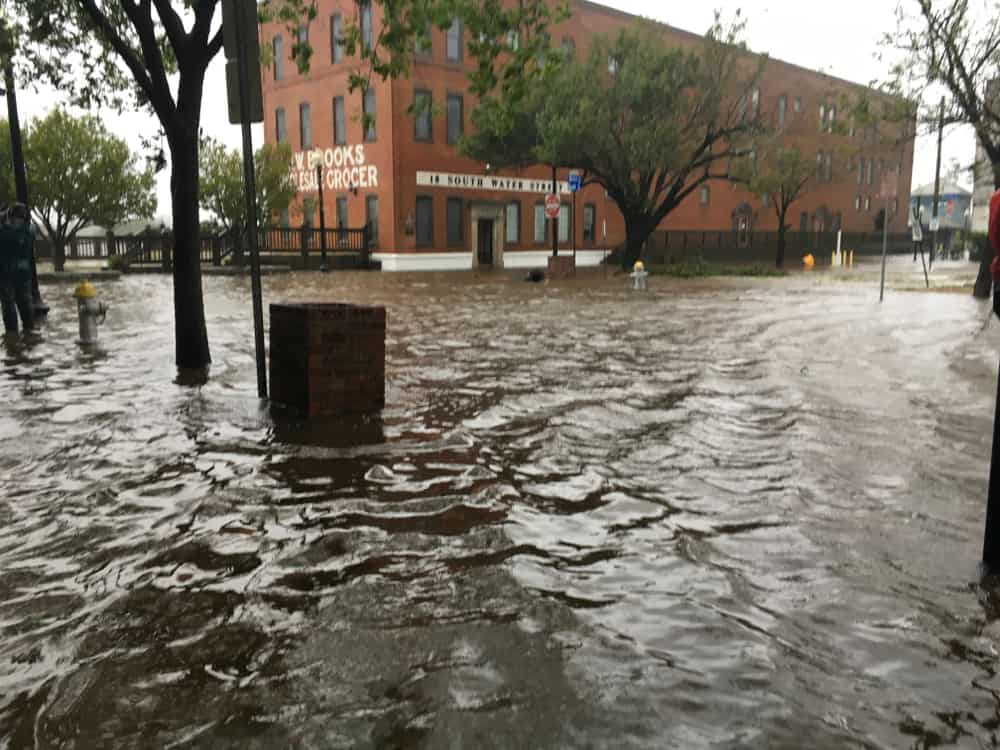
Lumberton, North Carolina residents affected by severe flooding during Hurricane Florence filed a class action lawsuit against CSX Corporation earlier this week. The suit claims the railroad company did not do enough to protect their property from the flood waters.
The lawsuit states that numerous homes and vehicles were damaged or destroyed across the south and west portions of the city earlier this month in the wake of the hurricane. It asserts that water “poured in through a gap in city levees,” and it says the gap was created by a railway underpass owned by CSX.
“The result was extensive flooding and damage to homes and businesses in Lumberton, North Carolina and displacement of hundreds of residents in what has been called ‘one of the poorest populations in what is arguably the least developed part of the state,’” the lawsuit reads. “Upon information and belief, CSX was aware that the underpass was a point of vulnerability for major flooding in Lumberton, ignored reports warning of the need for a permanent floodgate, and refused city officials’ pleas for permission to build a temporary berm to protect against forecasted Hurricane Florence flooding.”
It goes on to state that CSX was aware of the extent of the damages that could be caused by the absence of a floodgate because water poured into the city via the same site that allowed water from Hurricane Matthew to flood the city in 2016. The lawsuit said that flooding from Matthew displaced 1,500 residents for months and resulted in at least one fatality.
This month’s severe flooding came after a the North Carolina Emergency Management and the North Carolina Department of Transportation released a report called “Lumber Basin Flood Analysis and Mitigation Strategies Study” in May. The report concluded that a permanent solution was needed at the CSX underpass to prevent flood damages.
It estimated that a permanent floodgate could “reduce damage from floods equivalent to those caused by Hurricane Matthew by approximately 80 percent, saving about 2,000 buildings and $232.6 million.”
“Despite an offer by North Carolina Emergency Management and the Golden LEAF Foundation to provide $3.5 million in funding, when Hurricane Florence hit, no floodgate had been built to bridge the gap in the levees created by the CSX railway underpass,” the lawsuit reads. “Lumberton Mayor Bruce Davis stated that the delay in building the floodgate was a result of delays caused by CSX, stating ‘[t]he holdup is that we don’t have permission from the railroad to get on that property and do anything[,]’ as only the governor could override CSX and force them to participate in building a permanent floodgate.”
The lawsuit goes on to state that CSX was not an active participant in flood mitigation efforts as the city prepared for Hurricane Florence’s landfall, failing to attend meetings and refusing to allow city officials to build a sandbag berm across the underpass in the days before Florence made landfall.
“According to Davis, Lumberton city officials were told multiple times that CSX would consider anyone attempting to stem the flooding from the underpass to be a trespasser,” the lawsuit reads. “Lumberton City Planner Brandon Love said CSX threatened to sue anyone who tried to place sandbags across the underpass.”
North Carolina Governor Roy Cooper eventually allowed city leaders to place sandbags across the underpass on Sept. 14. The emergency berm bought residents some time before eventually breaking on Sept. 17, according to the lawsuit.
“State Senator and Robeson County Republican Danny Britt faults CSX, stating ‘CSX has not been a good community partner,’ and that ‘[i]f we had the floodgate, we wouldn’t have had any damage in West Lumberton,’” the lawsuit reads.
The class action complaint was filed on half of individuals and entities who sustained economic and property loss and damages due to the flooding.
“CSX made decisions impacting the safety of the health, welfare, and value of the people, businesses, and property of the Plaintiffs and Class Members in the direction of short-term gain, through reduced cost, rejecting adequate and responsible risk-analysis checks and balances to weigh cost and time versus risk and safety. The result was predictable in that the outcome mirrored the extensive flooding and damage that took place during Hurricane Matthew in 2016,” the lawsuit reads. “The flooding of the CSX railway underpass has caused, and continues to cause, devastating economic damage. For example, businesses have lost and continue to lose income; and property owners have suffered the loss, damage, and/or diminution of the value of their properties.”
The plaintiffs are seeking awards for damages in an amount to be determined at trial, and have demanded a jury trial “for any and all claims pled herein in which a jury trial is available by law.”
“While CSX does not comment on matters before the court, it is important to point out that Hurricane Florence was an extraordinary storm that brought record flooding and left many communities throughout the region devastated including Lumberton,” a CSX spokesperson said in a statement to the Jacksonville Business Journal. “CSX has extensive operations in the impacted communities where so many of our employees, customers and suppliers call home. Our thoughts are with those impacted by Hurricane Florence and we remain fully committed to working with the City of Lumberton to implement a permanent solution.”
The company, which reported $877 million in net earnings at the end of the second quarter of 2018, donated $100,000 to the American Red Cross for Hurricane Florence relief. It is also matching employees contributions dollar-for-dollar, according to a CSX media release.
Hurricane Florence is expected to be one of the most expensive hurricanes the U.S. has weathered, with U.S. Secretary of Commerce Wilbur Ross estimating it could cost as much as $180 billion earlier this month.
CSX has until Oct. 15 to respond to the lawsuit. If the company fails to do so, a judgement by default will be entered against it.
